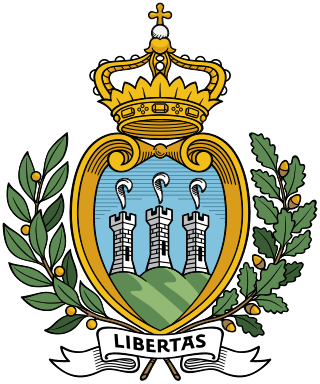
A seven-part abrogative referendum was held in Italy on 15 June 1997. Voters were asked whether they approved of the repealing of laws on topics including privatisation, conscientious objectors, hunting, the judiciary and journalists, as well as whether the Ministry of Agrarian Politics should be abolished. Although all seven proposals were approved by voters, the voter turnout of 30% was well below the 50% threshold and the results were invalidated.

A referendum on the electoral law was held in San Marino on 3 July 2005. Voters were asked four questions on changes to the electoral law and electoral system. Although all four were approved by a majority of those voting, voter turnout was just 21.7%, meaning that the quorum of 32% of registered voters (10,143) was not achieved for any question. This resulted in all four questions failing, including two that proposed raising the quorum to 40%.
A constitutional referendum was held in Switzerland on 19 April 1874. The new constitution was approved by 63.2% of voters and a majority of cantons. It gave more responsibilities and powers to the federal government.
Two referendums were held in Switzerland in 1876. The first was held on 23 April on the subject of distributing and cashing of banknotes, and was rejected by 61.7% of voters. The second was held on 9 July on a federal law on taxation of compensation for not serving in the military, and was rejected by 54.2% of voters.
A three-part referendum was held in Switzerland on 21 October 1877. A federal law on working in factories was approved by voters, whilst a federal law on compensation for not serving in the military and a federal law on the political rights of settled and travelling people and the loss of rights for Swiss citizens were both rejected.
Two referendums were held in Switzerland in January and May 1879. A federal law on subsidies for railways in the Alps was passed by 70.7% of voters on 19 January, whilst a referendum on abolishing the constitutional ban on the death penalty on 18 May was passed by 52.5% of voters and a majority of cantons. Following the vote, ten of the 26 cantons reintroduced the death penalty during the 1880s and 1890s and nine executions occurred before its nationwide abolition in 1938, when a new criminal code was approved in a referendum.
A four-part referendum was held in Switzerland on 11 May 1884. All four were rejected by voters.
Two referendums were held in Switzerland in 1887. The first was held on 15 May, asking voters whether they approved of a federal law on spirits, and was approved by 65.9% of voters. The second was held on 10 July, asking voters whether they approved of an amendment made to article 64 of the federal constitution, and was approved by 77.9% of voters and 20.5 cantons.
A referendum on a federal law on insolvency and debt was held in Switzerland on 17 November 1889. The new law was approved by 52.9% of voters.
A referendum on accident and health insurance was held in Switzerland on 2 October 1890. Voters were asked whether they approved of a federal resolution on amending the constitution with regards to accident and health insurance. It was approved by a majority of voters and cantons.
A referendum on disease control was held in Switzerland on 4 May 1913. Voters were asked whether they approved of amending two articles of the constitution, 31 II, lit d and 69, which covered the control of human and animal diseases. It was approved by a majority of voters and cantons.
A referendum on a war tax was held in Switzerland on 6 June 1915. Voters were asked whether they approved of amending the constitution to introduce a one-off war tax during the First World War, which Switzerland remained neutral. It was approved by a large majority of voters and all cantons, the first time a referendum had been passed in every canton.
A referendum on the military was held in Switzerland on 1 December 1940. Voters were asked whether they approved of amending articles 103 and 104 of the federal law that detailed the organisation of the Swiss military. The proposal was rejected by 55.7% of voters.
A referendum on unfair competition was held in Switzerland on 29 October 1944. Voters were asked whether they approved of a new federal law on unfair competition. The proposal was approved by 52.9% of voters.
A referendum on tenant and consumer protection was held in Switzerland on 13 March 1955. Voters were asked whether they approved of a popular initiative "for the protection of tenants and consumers", which would prolong price controls. Although the proposal was approved by a majority of voters, it was rejected by a majority of cantons, so did not come into force. Voters also voted on a counterproposal, which was rejected by a majority of voters and cantons.
Two referendums were held in Switzerland in 1960. The first was held on 29 May on continuing with temporary price controls, and was approved by 77% of voters. The second was held on 4 December on economic and financial measures for the dairy farming industry, and was also approved by voters.
Three referendums were held in Switzerland in 1964. The first was held on 2 February on granting a general tax amnesty, and was rejected by voters. The second was held on 24 May on a federal law on vocational education, and was approved by voters. The third was held on 6 December on continuing with price controls, and was also approved by voters.
Five referendums were held in Switzerland in 1970. The first was held on 1 February on a federal resolution on the domestic sugar market, and was approved by voters. The second was held on 7 June on a popular initiative "against foreign infiltration", and was rejected by voters. The third and fourth were held on 27 September on an amendment to the Swiss Federal Constitution regarding promoting gymnastics and sports, which was approved, and a popular initiative on the "right to habitation and expansion of family protection", which was rejected. The fifth was held on 15 November on an amendment to the federal financial order, which was rejected due to not enough cantons voting in favour.
Nine referendums were held in Switzerland in 1975. The first was held on 2 March on an amendment to the Swiss Federal Constitution on the article on the economic cycle. Although it was approved by a majority of voters, it did not receive the support of a majority of cantons, so was rejected. The next five were held on 8 June on protecting currency (approved), financing the national road network (approved), amending the general tariff (rejected), increasing taxes the following year (approved) and restricting federal expenditure (approved). The final three were held on 7 December on a constitutional amendment on the right to residence and welfare benefits (approved), a constitutional amendment on water management (approved) and a federal law on the import and export of agricultural goods (approved).
Fifteen referendums were held in Switzerland during 2000. The first five were held on 12 March on reforming the judiciary and four popular initiatives; "for speeding up direct democracy ", "for a just representation of women in federal authorities", "for the protection of men against manipulations in procreation technology" and one to reduce motorised road by 50%. Whilst the judiciary reform was approved, all four popular initiatives were rejected. The next referendum was held on 21 May to authorise sectoral agreements between Switzerland and the European Union, and was approved by around two-thirds of voters.


